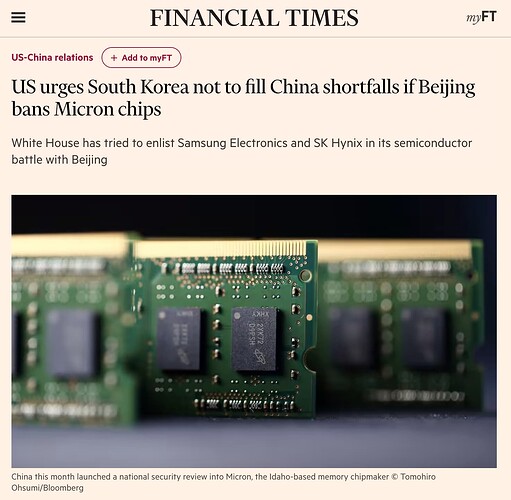- 白宫要求韩国敦促其芯片制造商,如果北京禁止总部位于爱达荷州的美光公司销售芯片,就不要填补中国的任何市场空白。
- 美国在总统尹锡悦准备前往华盛顿进行国事访问时提出了这个要求。
- 中国对美光公司发起了国家安全审查,目前还不清楚是否会采取惩罚性行动。
- 美光公司的案件是北京是否愿意对一家主要美国公司采取经济措施的试金石。
- 美国已经要求首尔鼓励三星电子和SK海力士在美光被禁止的情况下不要增加对中国的销售。
- 白宫的要求是在尹锡悦访问华盛顿的敏感时刻提出的。
- 韩国对美国在其经济安全议程背后拉拢盟友的努力感到不满。
- 美国可能对韩国公司有影响力,因为它在去年10月给了它们从中国出口的豁免权。
- 尹锡悦的政府对中国的立场比他的前任更为鹰派。
- 尹锡悦指责中国试图 "用武力 "改变台湾的现状。
- 美国和韩国正在讨论许多问题,包括美国如何在 "延伸威慑 "方面给韩国更多保证。
- 由于美国要求在其经济安全议程背后团结盟友,尹锡悦处于一个复杂的位置。
- 由于行业内的供应过剩,导致DRAM芯片的价格下降了25%,内存芯片制造商面临压力。
- 美国财政部长珍妮特-耶伦表示,华盛顿对 "最近针对美国公司的胁迫性行动的上升 "感到担忧。
美国正在请求首尔提供援助,以确保中国没有利用美光作为影响美国政策的杠杆。
美国正试图向北京表明,它将与盟友和伙伴合作,破坏任何针对美国或盟友公司的行动。
中国已经对其他国家使用了经济胁迫手段,但没有对美国采取重大行动。
中国官员对美国镇压中国公司的努力表示失望。
中国外交部发言人毛宁指责美国违反了市场经济和国际贸易。
美国对首尔的要求突出了华盛顿和北京之间的深刻断层。
美国将长江存储技术有限公司列入其 “实体名单”,意味着公司在没有许可证的情况下被禁止向新生的美光竞争对手出口美国技术
The White House has asked South Korea to urge its chipmakers to not fill any market gap in China if Beijing bans Idaho-based Micron from selling chips.
The US made the request as President Yoon Suk Yeol prepares to travel to Washington for a state visit.
China launched a national security review into Micron and it is unclear if punitive action will be taken.
Micron’s case is a litmus test of whether Beijing is willing to take economic measures against a major US company.
The US has asked Seoul to encourage Samsung Electronics and SK Hynix to not increase sales to China if Micron is banned.
The White House’s request comes at a sensitive time with Yoon’s visit to Washington.
South Korea has chafed at US efforts to rally allies behind its economic security agenda.
The US may have leverage with South Korean companies as it gave them waivers to export from China last October.
Yoon’s administration has a more hawkish stance on China than his predecessor.
Yoon has accused China of attempting to change the status quo over Taiwan “by force”.
The US and South Korea are discussing many issues, including how the US can give South Korea more assurance about “extended deterrence”.
Yoon is in a complex position with the US’s request to rally allies behind its economic security agenda.
Memory chip manufacturers are under pressure due to a glut in the industry, causing a 25% decline in the price of DRAM chips.
US Treasury Secretary Janet Yellen said Washington was concerned about “a recent uptick in coercive actions targeting US firms”.
US is requesting assistance from Seoul to ensure China is not using Micron as a lever to influence US policy.
US is attempting to show Beijing that it will work with allies and partners to undermine any move against American or allied companies.
China has used economic coercion against other countries, but has refrained from taking major action against the US.
Chinese officials have expressed their frustration with US efforts to crack down on Chinese companies.
China’s Foreign Ministry spokesperson Mao Ning accused the US of violating market economies and international trade.
US request to Seoul highlights the deep faultlines between Washington and Beijing.
US put Yangtze Memory Technologies Co on its “entity list”, meaning companies are barred from exporting American technology to the nascent Micron rival without a license
